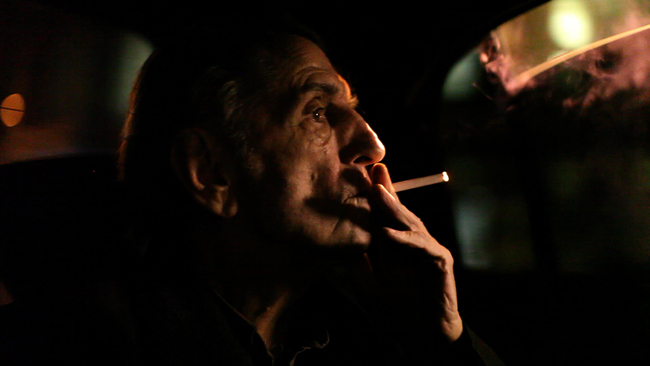Harry Dean Stanton: Partly Fiction
Directed by Sophie Huber
Switzerland, 2012
In keeping with the acting style of the subject of its focus, Sophie Huber’s Harry Dean Stanton: Partly Fiction stays away from extremes in its portrait of one of America’s greatest actors. There is affection, but it is understated and not glowing, while any melancholy elements are not over-stressed. The facts and opinions expressed, through Stanton and various collaborators, are simply allowed to be – free of added manipulation – in what amounts as a rather quiet documentary, excluding film clips with their own soundtracks and instances in which we get to see Stanton express his passion for performing music. Like the documentary’s most discussed film, Paris, Texas (1984), Partly Fiction is serene but also apt at emotional devastation, though, as in Wim Wenders’ masterpiece, sorrow and optimism are intertwined.
Mostly shot in crisp monochrome, courtesy of cinematographer Seamus McGarvey, Partly Fiction is a talking-heads style documentary that interviews Stanton one-on-one, as well as in the company of friends David Lynch and Kris Kristofferson; Sam Shepard, Wim Wenders and Deborah Harry also offer insights into their experiences with the man. Lynch describes Stanton’s acting as containing an “innocence and naturalness that’s really rare”, and that what he does in between the lines is incredible; where other actors may express even the tiniest gesture of calculation between readings, “in between the lines he is there, whatever that needs to be.”
The film opens with a caption posing the question, “Do you think you give something away by talking about yourself?” In one of the documentary’s trips to Stanton’s local drinking joints, a bartender who has known the actor for many years says to him, “You don’t talk too much, but when you say something it means something.” Related to this, Sam Shepard posits that Stanton is “one of those actors who knows his face is the story.” There are many topics in the film Stanton is hesitant to delve into in much detail, his upbringing among them. His rejection to elaborate is not expressed through annoyance, more a calmed weariness; relating to those comments from people who know him, it is his face that does much of the talking even outside of playing characters. It feels fitting with the one piece of advice he would give to young actors, that of personalising every role.
Stanton’s assistant, Logan Sparks, offers a counter to some of the notions the actor has expressed about himself: “He says he does nothing all the time, which is bullshit… It’s easy for an old person to look back and say he did nothing. Truth is he tried all his life. He’s still trying.” Sparks also suggests that Stanton is like the Forrest Gump of Hollywood, not in terms of intelligence, he stresses, but in that he stumbles through extraordinary circumstances, both good and bad; in one of his more bluntly-delivered statements, Stanton says we are not at all in charge of our lives despite what we may think.
Huber’s film is a beautiful portrait of a cinema great still often undervalued, and that rare star profile that actually enhances the mystique of the persona in question. Stanton tells Huber early on that he doesn’t give much away and he largely abides by that promise. His silences and musical performances speak volumes, though, as do the words of those also interviewed here. A Kris Kristofferson song apparently inspired by the man, and from which the film’s title is derived, perhaps sums up this drifting, lifelong lone wolf best: “He’s a walking contradiction, partly truth and partly fiction.”
Josh Slater-Williams
Visit the official website of the Edinburgh International Film Festival



